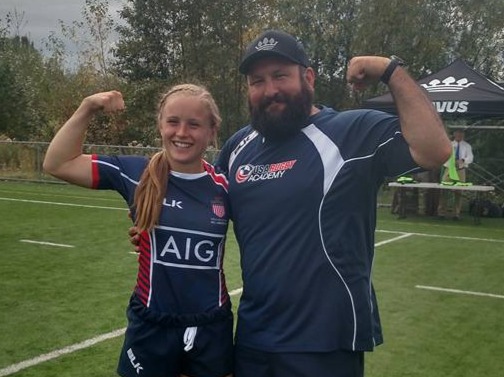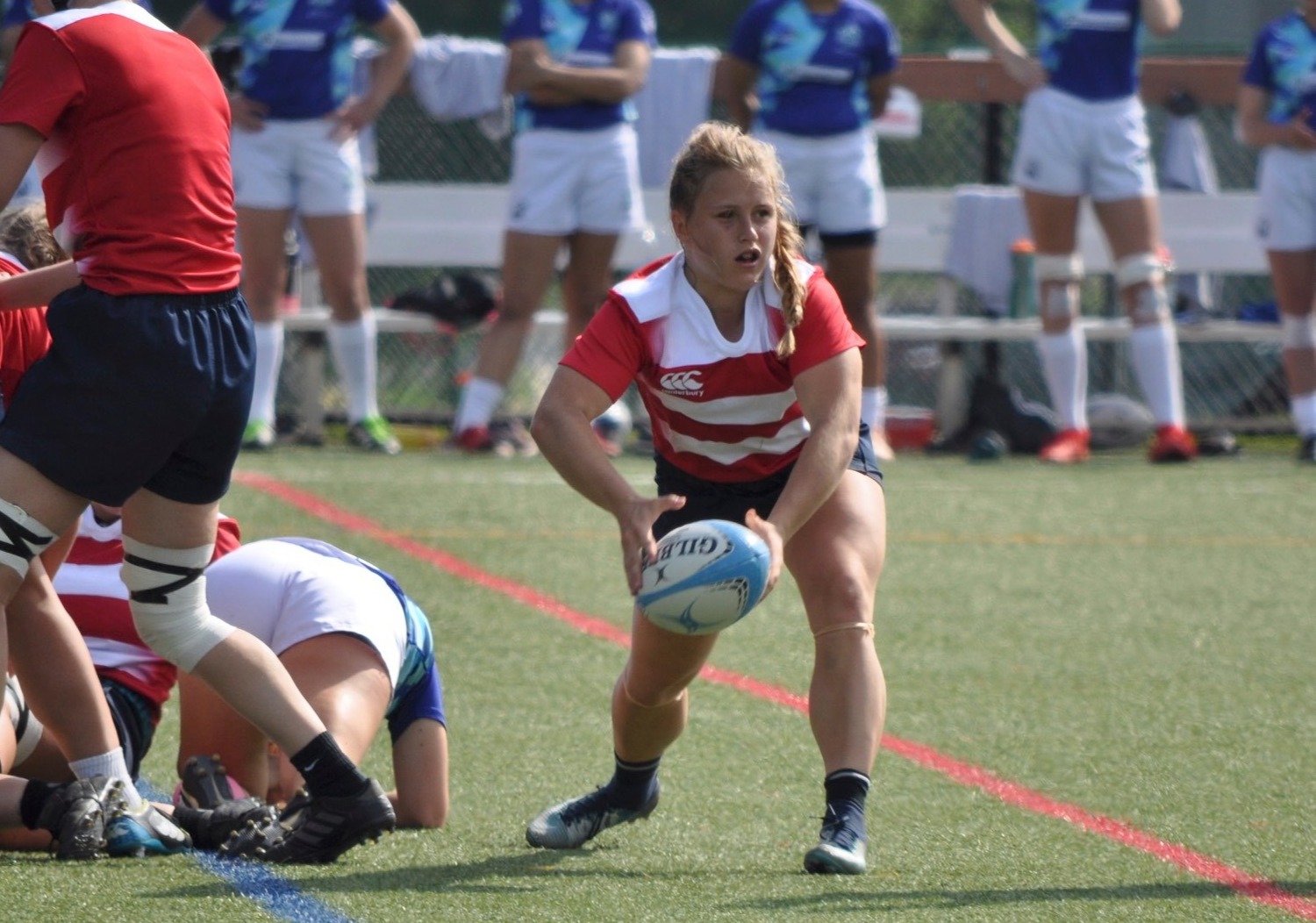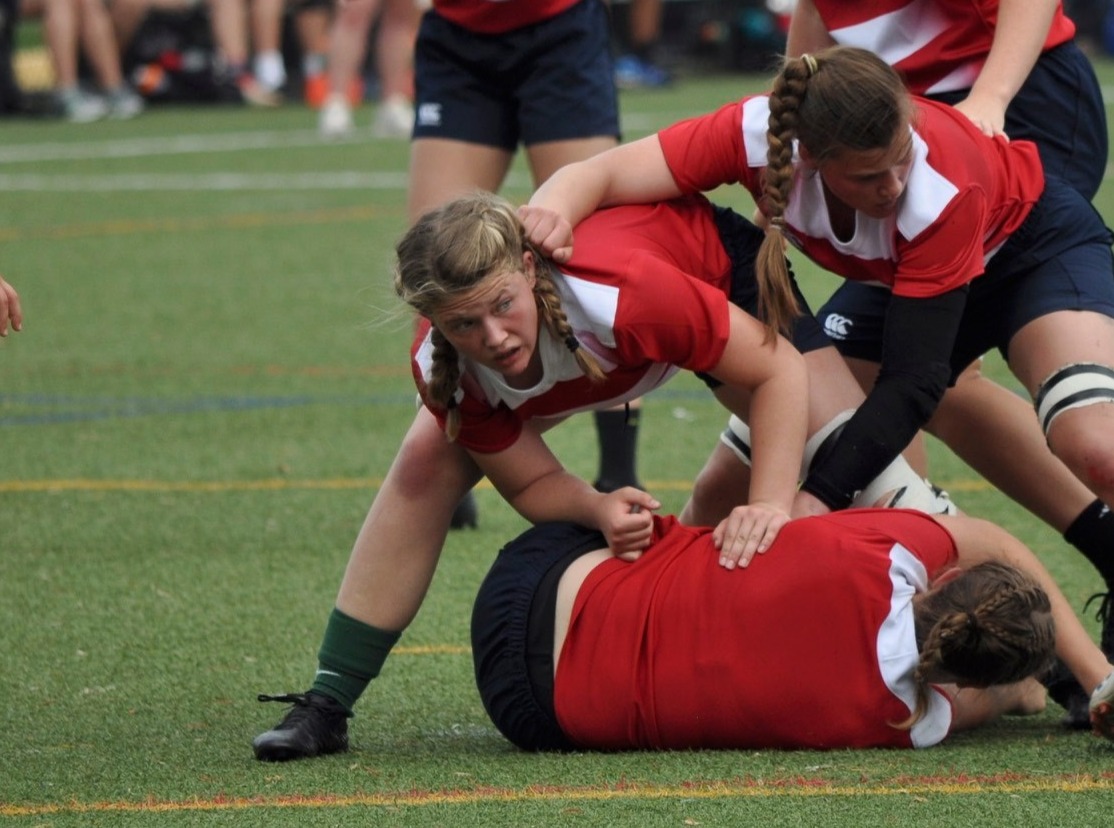
 Cassidy Bargell and Ricardo Ramirez in 2016
Cassidy Bargell and Ricardo Ramirez in 2016 Every day sees a new college, league or team announcing the suspension or cancelation of fall sports and a modified existence on campus due to Covid-19. For rugby, which is on the high-risk end of the transmission spectrum, many fall-centric teams are planning for a season without any games and brainstorming ways to retain, develop and recruit players.
USA U20 head coach Ricardo Ramirez implemented virtual training modules into the junior Eagles’ summer curriculum. He had such a positive experience with this mode of education and connection, that he intends to implement it this fall with Notre Dame, Ramirez’s hometown team.
“Over the last couple of winters I’ve talked about getting a coaches group together,” Ramirez tracked the evolution of the USA U20 virtual training. “Coaches of all different levels and areas would come together [virtually], we’d pick a topic, relax, and discuss it like we were having a coffee or a drink. It’s the best way to learn – chit chatting and sharing with your peers.”
When Covid-19 canceled the rugby spring season, Ricardo used the opportunity to realize the coaches group. He invited some coaches he knew, asked them to invite people, but also opened it up to the larger community, and was a little surprised that there wasn’t more interest.
“Goes to show the mentality around wanting to do a web chat,” Ramirez offered. “So we only had one rule: No lecturing. It wasn’t going to be me picking a topic and then teaching the group.”
Twenty coaches from around the country signed on.
Neil Kennedy photo: Coach Ramirez between Sam Tancredi and Darina Roe during the 2019 U20 Tri-Nations Cup in England.
“The idea of having coaches from different levels is, first, it’s nice to have the perspective,” Ramirez said. “What is the real day-to-day of a high school coach like? What are they thinking? We had high school, college, small college, senior club and some national team coaches, just to see what they were all talking about. Second, it’s just growing the game. The high school coach goes back to their community and helps other high school coaches, which in turn helps the college game, which helps promote the senior clubs, and so on.”
The group met once per week for a couple months this spring – until the state economies started reopening and people went back to work. The group covered everything from attack and defense philosophies, to intricacies of the scrum; the best use of video and other visuals; how to shape an online session; to team-building strategies, and much more.
“One of the first topics was: What can we do during the pandemic and how do we reach our players? What can and what should we do now,” the coach said. “Some coaches, for example, didn’t have any material or resources to provide their teams, like a PowerPoint slideshow of their attack. They might have talked about it and taught it at practice, but they never had anything written up, so that was one thing we suggested they do.”
Everyone contributed and shared ideas, and people reported back with successes and struggles for the group’s benefit. It was a fruitful experiment that Ramirez intends to revivify in the winter.
Meanwhile Ramirez was busy making sure that Notre Dame was coping with its canceled spring season. Players were worried about team unity and support, and wanted to plan for an uncertain future. The team got into Zoom workouts, Ramirez continually checked in with players, and the group poured its activity into Milanote. The app is similar to Pinterest with visual boards, and the team created portals to drills on YouTube, skills challenges, general resources, personal updates, etc.
“It can be daunting,” Ramirez confessed to a mild strain of technophobia. “I went to a player, ‘You are the tech generation. Can you help me do this?’ They set it up and then it took me 20 minutes to figure it out. Most of these apps are user-friendly these days, so don’t let that be an excuse [to not venture online].”
The comfort with Milanote, paired with the experience of the coaches group, helped Ramirez shape his vision for the USA U20s’ virtual training.
“The U20s are a little more involved right now,” Ramirez explained. “With Notre Dame, I was giving them a light summer because of everything’s that going on, but for the U20s, once we realized the [summer] camps and competitions were going to be canceled, it was: How can we still provide them some resources?”
Attention turned to the classroom. Ramirez, staff and the current USA U20 player pool have been meeting for more than two months now, signing on every Monday for four consecutive weeks and then taking two weeks off. Meetings begin with the full group, and staff might introduce some film or pose a couple questions to ponder, and then pods of five break out into private Zoom calls to discuss. The pods then reassemble for a full-group discussion.
 Bargell with U20s / Photo: Anne-Marie Lemal Brown
Bargell with U20s / Photo: Anne-Marie Lemal Brown “Two things are really key,” Ramirez said. “The players like that it’s more interactive and that we’re not just giving a long lecture, because who likes that? We’ve been able to stick to about an hour and 15 minutes and that timeframe is good. Second, they like using smaller groups. In the breakout rooms they’re giving themselves peer-to-peer context and getting different perspectives from each other.”
Cassidy Bargell has been in the USA U20 system since 2016 and did some online training with the junior Eagles in the run-up to the 2018 Tri-Nations Cup. The Harvard scrumhalf is part of the senior leadership group and has enjoyed watching the younger or newer players express themselves in the breakout sessions and then have the confidence to address the larger group.
“In camp we are so focused on putting pieces together and making sure everyone understands our system,” Bargell explained. “With these online modules we’ve been able to not only make sure everyone is on the same page in our system, but also analyze film more closely, and talk broadly about things like finding ways to motivate at home. Being able to spread out the Zoom sessions also allows more time for everyone to reflect and really absorb information, whereas camps can at times feel overwhelming.”
“There’s also been speakers from the Eagles who have talked about their experiences as well as some elements of team building, just getting to know each other a little bit,” added U20 loose forward Marin Pennell (Dartmouth). “It’s great to have the time to set some building blocks and a common language for our play before we actually get to a camp. The speakers and team building is an added bonus as well helping us connect.”
 Pennell with U20s / Photo: Anne-Marie Lemal Brown
Pennell with U20s / Photo: Anne-Marie Lemal Brown Ramirez is pleased with the pilot and started to bring in players who would have been invited to the next U20 camp or U18s with the potential to project. He wants to keep expanding his reach, because the program is still recruiting talent, despite the lack of on-pitch scouting opportunities during the pandemic.
“Obviously at first they were really tuned in because when we started doing this, everyone had lost their spring seasons and they were coming in really eager and hungry,” Ramirez reflected on the progression of the online meetings. “But now that we’ve established it, they look forward to it. It’s not just this fun distraction; it’s helping create value and they see that.”
Ramirez intends to continue the virtual meetings during the school year, which will be new territory given colleges’ varying return-to-campus directives. Bargell indicated that staff have been receptive to players’ feedback and done a good job keeping things casual thus far, and that fosters an enjoyable experience.
“I think they are definitely a benefit and should continue,” Pennell endorsed the online sessions. “Simply in the sense of creating some familiarity with each other and the systems of play we are going to be using when we play together! Camps are super limited time wise so anything we can do outside of them to get on the same page before we arrive is great. It would ideally let us use camp to focus on the execution of the systems we’ve learned together rather than learning those systems from the ground up every time.”
Now that the collegiate school year is approaching, Ramirez has returned attention to Notre Dame. Some of the concerns from the spring – how to connect, motivate and support teammates – are still relevant, but the fall brings new objectives. Fall is recruitment season and the team is busy figuring out how to move its in-person outreach online. Ramirez is deciding what material needs to be generated and shared, so players don’t feel like they’ve lost progress and can stay active. He is also considering areas where the team as a whole could improve.
“I’ve created a lot of basic skills videos and write-ups about stuff, but there is a lot of content already out there,” Ramirez said. “It’s really opened my eyes. The material you want to teach, someone has made that video. You have to wade through them for the one you like, but it’s out there. And if it’s not, it’s actually not that hard to make.”
Ramirez chuckles at that statement, considering where he started 2020. He admitted he was intimidated by the research to find the right platform for online training sessions and team apps, but the effort was worth it.
“If tech is your problem, then realize that I am that person, too. I was overwhelmed [with Milanote], but I just had to go to a player for help,” Ramirez spoke to coaches’ potential barriers to online training. “I went from a guy who used his phone for texts and computer for e-mails and Netflix, and now I host Zoom meetings and have a YouTube channel!
“Another fear is how much time it’s going to take to set everything up and keep it going,” he continued. “But if you want to reach out to your players, then you’re already committed in that way. You see value in it. Obviously it’s going to take time, but having an hour set aside so that the team can talk about their lives, that’s beneficial. It just depends how much you want to put into it. At any college, there are those coaches who show up for those two hours of practice and those who are working seven days a week, and that influences the product.”





